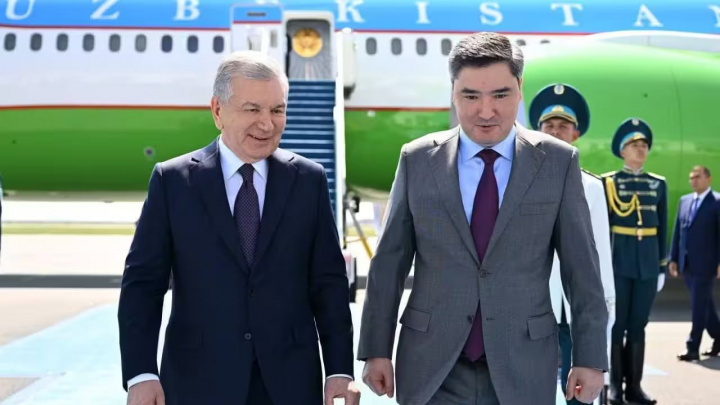Price gap drives Uzbeks to shop in Kazakhstan
Dishwashing gel, yogurt, sausages, sweets... Uzbeks entering through the “Navoi” (known as “Qaplonbek” on the Kazakh side) border checkpoint in Tashkent district are carrying such household goods. Those interviewed by Kun.uz stated that prices in Kazakhstan are relatively cheaper.
For citizens entering Uzbekistan from abroad, the limits for bringing in goods for non-commercial purposes are being reduced. According to a government decision, starting May 1, those arriving by plane will be able to bring in duty-free goods worth up to $1,000 instead of the current $2,000.
For those arriving by train, the duty-free limit is being lowered from $1,000 to $500. The $300 limit for those entering Uzbekistan by car or on foot remains unchanged.
A Kun.uz correspondent visited the “Navoi” (Qaplonbek on the Kazakh side) border post in Tashkent district to inquire about the types of products Uzbeks are bringing back from Kazakhstan for personal use.
According to citizens entering through the post, they are mainly bringing food and other household items for personal needs. The primary reason is the significant price difference between Uzbekistan and Kazakhstan.
Below are quotes from Kun.uz interviewees:
“We transport clothes, dried fruits, and similar items to Kazakhstan. On their return, people bring oil, meat, diapers, and detergent for personal use. These are the ones I see most often.”
“In today’s conditions, saving even 10,000 UZS is good. That’s why people keep going back and forth; things are cheaper there [in Kazakhstan], with quite a difference.”
“Look, I’m bringing sweets for my children and grandchildren. My pension isn’t enough; I get 881,000 UZS. My legs and back hurt, so I do a little ‘treatment’ to make a living. I don’t sell to strangers, only to my daughters and sons. They pay me.
Sausages and gels are cheaper [in Kazakhstan]. If I buy [detergent] for 42,000 UZS, it costs 90,000–100,000 UZS here. Tell me, what can I do? I bring them for my kids, tell them to cover my travel expenses, and they do. Sausages are 35,000 UZS there, but 70,000 here. Honestly, I sell them to my kids for 45,000, adding just 10,000. Neighbors ask for them too. Meat is expensive here… They tell me I cross too often, but what does an 881,000-soum pension cover?”
“They’re not allowing goods; I’m bringing things for household use. Sausages, milk, ‘Shedroe Leto,’ they allow 5 kg of meat. I bring them because they’re cheaper. The price difference is about 20,000 UZS.”
“We bring chocolates and oil. Clothes too. I think the quality is better. They’re also cheaper. If you eat Uzbekistan’s chocolate, it smells like margarine, to be honest. But you enjoy eating Kazakh waffles.”
“For my house, I bring things my kids eat – crab sticks, chocolate, cookies, stuff like that. Their quality is better, and my kids love them. This time, I bought a microwave for my kids. It was a bit cheaper, so I got it from there.”
“Sausages, gels, detergents, diapers... Many things are cheaper there. Almost half the price. For example, [dishwashing] gel is 40,000 UZS there, but 80,000 here. I go every 4–5 days or once a week. We have relatives there, so that’s why.”
“We went to visit someone; our classmate was there. Things are cheap there, so we’re bringing back a couple of items. I got sausages and sweets. They’re cheap; sausages are 44,000 UZS. They’re very expensive here, so... I bought slippers for 35,000 UZS. From a place called Oqsuv, I got shorts for 12,000 UZS. Since I was visiting, I didn’t want to return empty-handed, so I borrowed a little from the girls and bought things out of curiosity. Otherwise, I wouldn’t have. I was tempted by the low prices.”
“We buy chocolate, waffles, sweets. Look, I got yogurt for the house at 2,500 UZS. Here, it’s 5,000–6,000 UZS. This chocolate was 30,000 UZS, but here it’s 60,000–70,000, expensive. It’s cheaper there.”
Based on the aforementioned decision, starting June 20, 2025, citizens who travel abroad and return on the same day or within 1–2 days will not be allowed to bring goods within the duty-free limit.
Individuals crossing by car or train must have been abroad for at least 2 days, and those arriving by plane for at least 3 days, to bring in duty-free goods for non-commercial purposes.
Otherwise, the goods they bring will be considered above the duty-free limit, and a single customs payment will be levied based on the full value of the goods.
Previously, the Customs Committee had commented on the tightening of restrictions.
Related News

15:56 / 19.06.2025
Uzbekistan and Belarus aim to boost bilateral trade to $1 billion

20:06 / 17.06.2025
Uzbekistan supports China–Central Asia connectivity with new energy and tech initiatives

11:59 / 17.06.2025
President Mirziyoyev arrives in Astana for Central Asia–China summit

12:30 / 16.06.2025



